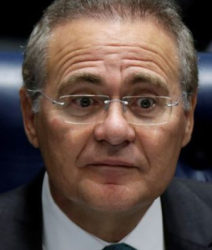BRASILIA, (Reuters) – The Senate impeachment trial of suspended Brazilian President Dilma Rousseff descended into a shouting match between her political supporters and opponents during its second day yesterday, forcing a two-hour halt in the proceedings. Supreme Court Chief Justice Ricardo Lewandowski, who is presiding over the final phase of a lengthy impeachment process that has paralysed Brazilian politics since December, suspended the session after Senate President Renan Calheiros was unable to stop the arguments. The trial resumed after lunch.
Supporters and opponents of Rousseff shouted insults at each other in a tumultuous session that showed the buildup to a final vote expected on Wednesday morning will be fraught with tension.
“This impeachment trial has become a loony bin,” Calheiros said, appealing for calm.
But Calheiros himself set off another argument by taking on Gleisi Hoffmann, a senator from Rousseff’s Workers Party, for stating the Senate lacked moral authority to try the leftist president. He said Hoffmann did not have a leg to stand because he had helped the senator avoid corruption charges a month ago.
The trial is expected to culminate in the removal of Rousseff from office, ending 13 years of left-wing Workers Party rule, and the confirmation of her vice president, Michel Temer, as president for the remainder of her term through 2018.

Temer has been interim president since mid-May, when Rousseff was suspended after Congress decided it would continue the impeachment process that began in the lower house. Her opponents need 54 votes, or two-thirds of the 81-seat Senate, to convict her of breaking budget laws.
A survey by the O Estado de S.Paulo newspaper published on Friday found 54 senators backed her ouster and 18 opposed it, with 14 undecided or not saying.
A deep recession and wide-ranging corruption scandal has caused Brazil’s first female president’s popularity to plummet since she won reelection in 2014. Polls show a majority of Brazilians want her gone.
But polls also show that Temer has as little popular support as Rousseff and that the majority of Brazilians would like to see new elections called, an unlikely development.
Few if any Rousseff supporters have shown up outside Brazil’s Congress building to back her, underscoring the impeached president’s isolation.
Rousseff, a former leftist guerrilla who was imprisoned and tortured during Brazil’s military dictatorship, is charged with spending without congressional approval and manipulating government accounts to mask the extent of the nation’s growing deficit in the run-up to her reelection.
Rousseff has denied any wrongdoing and described efforts to oust her as a “coup” plotted by Temer and his political allies, many of whom are caught up in the huge kickback scandal at state-run oil company Petrobras that has engulfed much of Brazil’s political and business class.
If confirmed as president, Temer would face a daunting task: steering Latin America’s largest economy out of recession and plugging a budget deficit that has topped 10 percent of gross domestic product.
Temer will need to quickly demonstrate his commitment to cutting the budget deficit if he is to sustain investor optimism after a major rally in financial markets this year.




